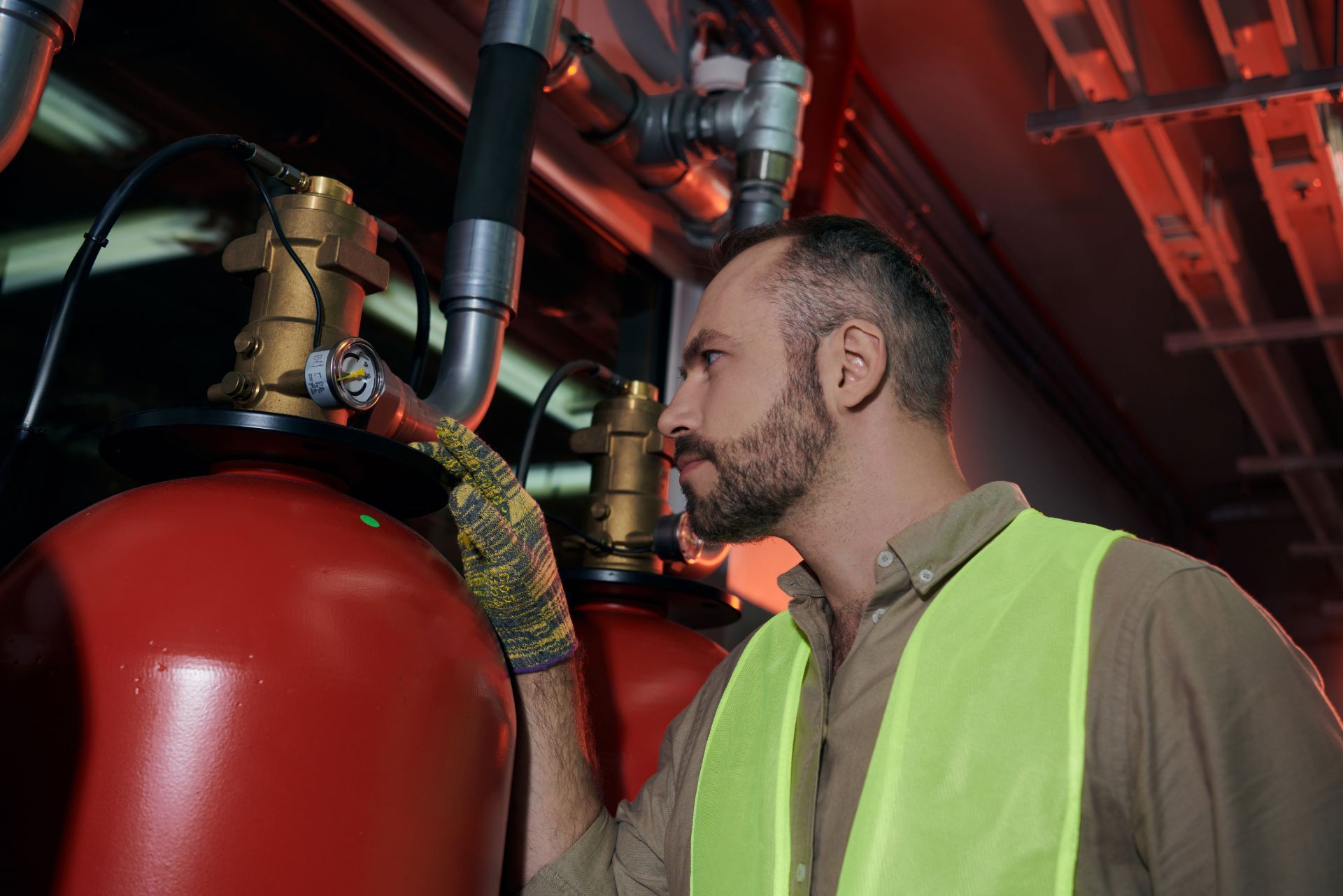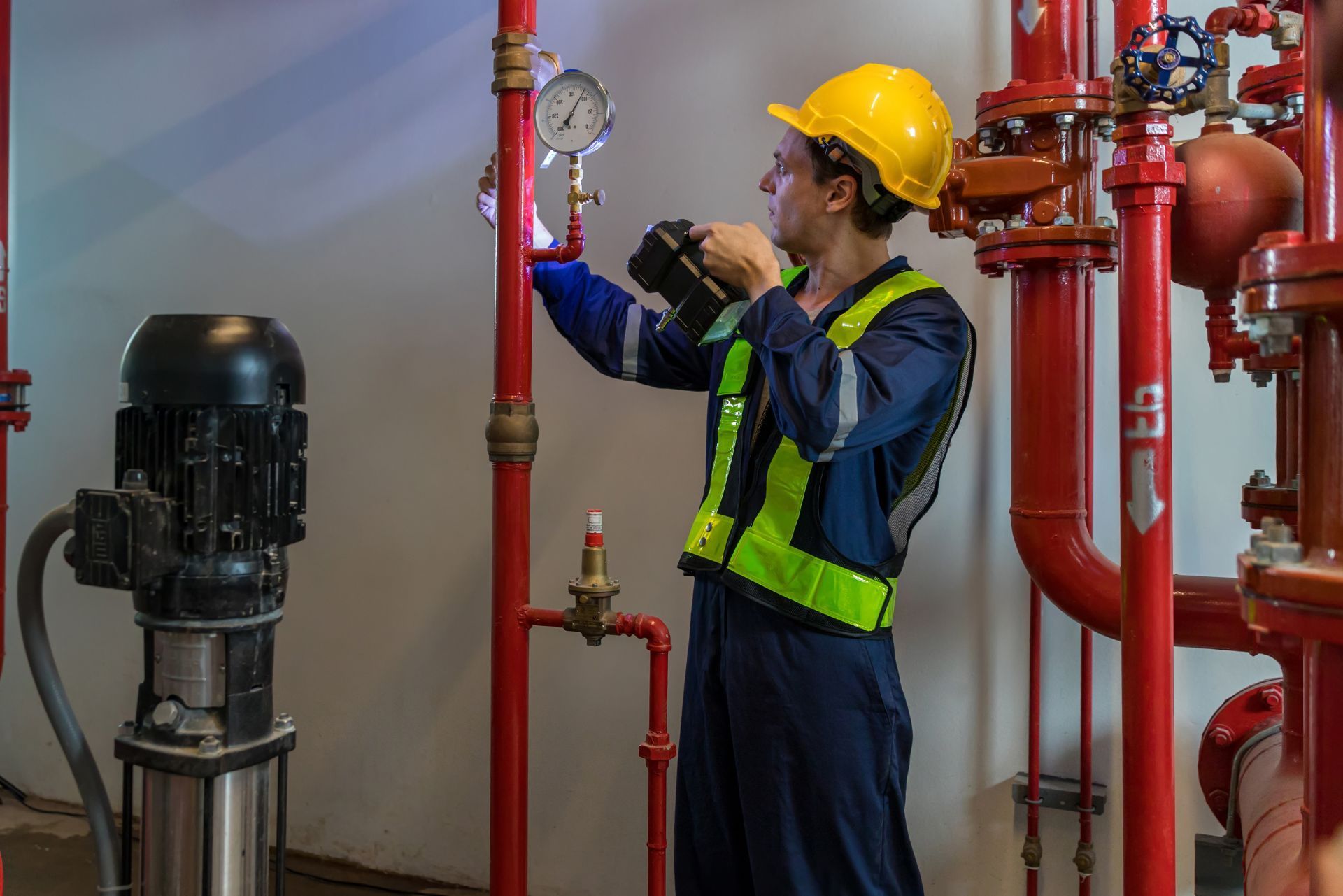South Carolina Fire Protection Contractor Insurance

9:00am - 5:00pm Mon-Fri
Will Reply in 15min*
Index
Contact Us
Phone
864-626-6181
service@southerninsured.com
Location
5 Century Drive Suite 130 Greenville, SC 29607
810 Dutch Square Boulevard, Suite 123 Columbia, SC 29210
When it comes to ensuring safety in buildings, fire protection contractors play a crucial role. They are responsible for installing, maintaining, and inspecting fire suppression systems, alarms, and other safety measures. However, like any other profession, the risks involved in this field necessitate adequate insurance coverage. This article delves into the specifics of fire protection contractor insurance in South Carolina, providing essential information for contractors and business owners alike.
Understanding Fire Protection Contractor Insurance
Fire protection contractor insurance is designed to protect businesses that provide fire safety services. This type of insurance typically covers a range of liabilities, including property damage, personal injury, and professional errors. Understanding the nuances of this insurance is vital for contractors to ensure they are adequately protected.
Types of Coverage
There are several types of coverage that fire protection contractors should consider. The most common include:
- General Liability Insurance: This covers third-party bodily injury and property damage claims. If a client or visitor is injured on the job site, this insurance can help cover medical expenses and legal fees.
- Professional Liability Insurance: Also known as errors and omissions insurance, this protects against claims of negligence or inadequate work. If a fire protection system fails due to a design flaw or oversight, this coverage can be crucial.
- Workers' Compensation Insurance: This is essential for businesses with employees. It covers medical expenses and lost wages for workers injured on the job, protecting both the employee and employer from potential lawsuits.
Importance of Coverage
Having the right insurance coverage is not just a legal requirement; it also provides peace of mind. Fire protection contractors often work in high-risk environments, and accidents can happen. Insurance helps mitigate the financial burden associated with these incidents, allowing contractors to focus on their work without the constant worry of potential liabilities.
Moreover, many clients require proof of insurance before hiring a contractor. This requirement not only protects the client but also enhances the contractor's credibility and professionalism in the industry. A solid insurance policy can serve as a marketing tool, demonstrating to potential clients that the contractor takes their responsibilities seriously and is prepared for any eventuality.
Additionally, fire protection contractors should be aware of the evolving nature of fire safety regulations and standards. As technology advances and new materials are introduced, the risks associated with fire protection services can change. Having comprehensive insurance coverage not only protects against current risks but also positions contractors to adapt to future challenges in the industry. Regularly reviewing and updating insurance policies ensures that contractors remain compliant and adequately protected as they navigate the complexities of fire safety regulations.

Legal Requirements in South Carolina
In South Carolina, certain legal requirements govern insurance for fire protection contractors. Understanding these regulations is crucial for compliance and to avoid potential penalties.
State Regulations
South Carolina does not have a specific law mandating fire protection contractors to carry insurance. However, general liability insurance is highly recommended and often required by clients. Additionally, contractors must comply with state licensing requirements, which may include proof of insurance as part of the application process.
Furthermore, contractors should be aware of any local regulations that may impose additional insurance requirements. It is advisable to consult with a legal expert or insurance agent familiar with the fire protection industry in South Carolina to ensure compliance. Local municipalities may have unique codes or ordinances that dictate specific insurance levels or types, particularly in areas with higher fire risks or unique building structures. Being proactive in understanding these local nuances can prevent costly delays or legal challenges.
Licensing Requirements
To operate legally in South Carolina, fire protection contractors must obtain the appropriate licenses. The South Carolina Department of Labor, Licensing and Regulation (LLR) oversees the licensing process. Contractors must demonstrate their qualifications, which often include passing exams and providing proof of insurance.
Maintaining an active license is crucial, as failing to do so can result in fines or the inability to operate legally. Keeping insurance up to date is an essential part of this process, as it reflects the contractor's commitment to safety and professionalism. Additionally, contractors should consider the benefits of obtaining specialized certifications in fire protection systems, as these can enhance credibility and potentially open doors to larger contracts. Engaging in continuous education and training not only aids in compliance but also helps contractors stay informed about the latest technologies and best practices in fire safety, ultimately benefiting their clients and the communities they serve.
Factors Influencing Insurance Costs
The cost of fire protection contractor insurance can vary significantly based on several factors. Understanding these elements can help contractors make informed decisions when selecting coverage.
Business Size and Revenue
One of the primary factors influencing insurance costs is the size of the business and its annual revenue. Larger companies with more employees and higher revenue typically face higher insurance premiums due to the increased risk associated with larger operations.
Conversely, smaller contractors may benefit from lower premiums, but they should still ensure they have adequate coverage to protect against potential liabilities. Insurance providers often evaluate the overall risk profile of the business when determining rates. Additionally, the geographical area in which a contractor operates can also play a role; regions with higher rates of fire incidents or stricter regulations may see increased costs. Therefore, understanding the local market dynamics is crucial for contractors when assessing their insurance needs.
Type of Work Performed
The specific services offered by a fire protection contractor can also impact insurance costs. Contractors who specialize in high-risk activities, such as installing complex fire suppression systems, may face higher premiums compared to those who provide basic services.
Insurance providers assess the level of risk associated with different types of work. Therefore, contractors should be transparent about their services when seeking quotes to ensure they receive accurate pricing. Moreover, the use of advanced technology and innovative fire protection solutions can also influence costs. For instance, contractors utilizing cutting-edge equipment or eco-friendly materials may find insurers willing to offer discounts for their commitment to safety and sustainability. This highlights the importance of staying updated with industry trends, as adopting new practices can not only enhance service offerings but also positively impact insurance premiums.
Claims History
A contractor's claims history can significantly influence insurance rates. If a contractor has a history of frequent claims, they may be viewed as a higher risk, resulting in increased premiums. Conversely, a clean claims history can lead to lower rates and more favorable terms.
Contractors are encouraged to maintain safety protocols and risk management practices to minimize the likelihood of claims. This proactive approach not only enhances safety but can also lead to cost savings on insurance premiums. Furthermore, engaging in regular training sessions for employees on safety measures and emergency response can further mitigate risks. Insurers often look favorably upon contractors who demonstrate a commitment to ongoing education and risk reduction, which can result in lower premiums and better coverage options. Building a solid reputation for safety and reliability can also enhance a contractor's standing with
insurance providers, potentially leading to more competitive rates in the long run.
Choosing the Right Insurance Provider
Selecting the right insurance provider is a critical step for fire protection contractors. The right insurer can make a significant difference in coverage quality and customer service.
Researching Providers
Contractors should conduct thorough research when evaluating insurance providers. This includes checking their reputation, financial stability, and customer reviews. Online resources, industry forums, and recommendations from peers can provide valuable insights into potential insurers.
It is also beneficial to compare quotes from multiple providers. This allows contractors to assess coverage options and pricing, ensuring they find a policy that meets their needs without breaking the bank. Additionally, understanding the claims process of each provider is essential; a provider that is known for quick and fair claims handling can save contractors time and stress in the event of an incident.
Understanding Policy Details
Before committing to an insurance policy, contractors must carefully review the terms and conditions. This includes understanding coverage limits, exclusions, and any additional endorsements that may be necessary for specific services.
Contractors should not hesitate to ask questions or seek clarification on any aspects of the policy that are unclear. A knowledgeable insurance agent can help navigate the complexities of fire protection contractor insurance and ensure that contractors are adequately covered. Furthermore, it’s wise to periodically reassess insurance needs as the business grows or changes; what was sufficient coverage a year ago may not be adequate today, especially as new risks emerge in the fire protection industry.
Moreover, contractors should consider the importance of customer service when choosing an insurance provider. A responsive and supportive insurer can make a world of difference, particularly during stressful situations such as filing a claim. Establishing a good relationship with the insurance agent can also lead to better insights into policy adjustments and additional coverage options that may be beneficial as the business evolves. Ultimately, a proactive approach to understanding and managing insurance needs can lead to enhanced peace of mind for contractors, allowing them to focus on delivering top-notch fire protection services to their clients.

Claims Process for Fire Protection Contractors
WIn the unfortunate event of an incident, understanding the claims process is essential for fire protection contractors. A smooth claims process can significantly impact the recovery from an incident. Having a clear grasp of the steps involved can help streamline the process and minimize stress during what is often a challenging time.
Steps to Filing a Claim
Filing a claim typically involves several key steps:
- Notify the Insurance Provider: As soon as an incident occurs, contractors should notify their insurance provider. Many insurers have specific timelines for reporting claims, so prompt communication is crucial.
- Document the Incident: Gathering evidence is vital for a successful claim. This includes taking photographs, collecting witness statements, and documenting any relevant details about the incident.
- Complete the Claim Form: Insurance providers will require a completed claim form, which outlines the details of the incident and the damages incurred. Providing accurate and thorough information is essential.
Working with Adjusters
After a claim is filed, an insurance adjuster will typically be assigned to investigate the incident. The adjuster will assess the damages and determine the validity of the claim. Contractors should cooperate fully with the adjuster, providing any requested information or documentation.
It is also important for contractors to keep detailed records of all communications with the insurance company throughout the claims process. This documentation can be invaluable if disputes arise. Additionally, contractors should be prepared to explain the specifics of their fire protection systems and how they were impacted by the incident, as this can help the adjuster understand the full scope of the damages and the necessity for repairs or replacements.
Furthermore, contractors may benefit from consulting with legal or insurance professionals who specialize in claims related to fire protection. These experts can provide guidance on navigating complex policy language and ensure that all aspects of the claim are addressed thoroughly. Having an advocate can also help in negotiating settlements and ensuring that the contractor receives a fair assessment of their losses, which is crucial for restoring operations and maintaining business continuity.
Best Practices for Fire Protection Contractors
To minimize risks and ensure smooth operations, fire protection contractors should adopt best practices that enhance safety and compliance.
Implementing Safety Protocols
Establishing comprehensive safety protocols is essential for any fire protection contractor. This includes regular training for employees on fire safety measures, proper equipment handling, and emergency response procedures.
Additionally, conducting routine inspections of equipment and work sites can help identify potential hazards before they lead to incidents. A proactive approach to safety not only protects employees but also reduces the likelihood of costly insurance claims. Furthermore, incorporating technology such as mobile apps for real-time reporting of safety issues can streamline communication and ensure that all team members are aware of current safety standards and practices.
Maintaining Comprehensive Documentation
Keeping detailed records of all projects, inspections, and maintenance activities is crucial for fire protection contractors. This documentation serves as evidence of compliance with industry standards and can be beneficial during the insurance claims process.
Furthermore, maintaining clear communication with clients regarding the services provided and any potential risks can foster trust and transparency, which are vital for long-term business relationships. Regularly updating clients on the status of their fire protection systems, including any necessary upgrades or changes in regulations, can position contractors as proactive partners in safety. This level of engagement not only enhances client satisfaction but also opens the door for future business opportunities through referrals and repeat contracts.
Conclusion
Fire protection contractor insurance is an essential aspect of operating a successful business in South Carolina. Understanding the types of coverage available, legal requirements, and factors influencing insurance costs can help contractors make informed decisions.
By choosing the right insurance provider, implementing best practices, and maintaining thorough documentation, fire protection contractors can safeguard their business against potential risks. Ultimately, investing in comprehensive insurance coverage not only protects the contractor but also ensures the safety and well-being of clients and the community.
In a field where safety is paramount, having the right insurance is not just a necessity; it is a commitment to excellence and professionalism. With the right knowledge and preparation, fire protection contractors can thrive in their industry while providing essential services that save lives and property.







